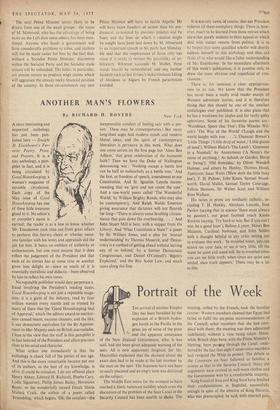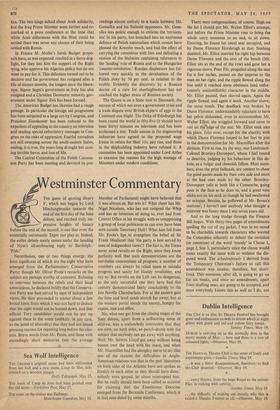Portrait of the Week
The Middle East seems for the moment to have reached a finely balanced stability which even the discussion of the problem of the Suez Canal in the Security Council has been unable to shake. The meeting, called by the French, took the familiar course : Western membefs claimed that Egypt had failed to fulfil the six-point recommendations of the Council, other members, that she had com- plied with theM; the meeting was then adjourned indefinitely without a vote being taken. Mean- while British ships have, with the Prime Minister's . blessing, been passing through the Canal, unde- terred by the fact that eight Conservative members had resigned the Whip in protest. The debate in the Commons on Suez followed as familiar a course as that in the Security Council. Many old arguments were revived in well-worn clothes and the Government won by a comfortable majority.
King Feisal of Iraq and King Saud have finished their confabulations in Baghdad, successfully enough in spite of the absence of King Hussein, who was preoccupied, he said, with internal poli,\ tics. The two kings talked about Arab solidarity, but the Iraq Prime Minister went farther and re- marked at a press conference at the time that while Arab differences with the West could be settled there was never any chance of their being settled with Russia.
In France M. Mollet's harsh Budget propo- sals have, as was expected, resulted in a fierce dog- fight, for they lost him the support of the Right wing, who approve his Algerian policy but do not want to pay for it. This defection turned out to be decisive and his government has resigned after a life of sixteen months, the longest since the libera- tion. Signor Segni's government in Italy has also resigned and a Christian Democrat minority gov- ernment under Signor Zoli has been formed.
The American Budget has likewise had a rough passage. In particular the foreign aid programme has been subjected to a large cut by Congress, and President Eisenhower has been reduced to the expedient of appealing to the country on television and sending special exhortatory messages to Con- gress on the risks of aggression. Fearful tornadoes are still sweeping across the south-eastern States, ending, it is true, the years-long drought but caus- ing terrible havoc and loss of life.
The Central Committee of the Polish Commu- oist Party has been meeting and devoted its pro- ceedings almost entirely to a tussle between Mr. Gomulka and his Stalinist opponents. Mr. Gom- ulka was politic enough to criticise the 'revision- ists' in his party, but launched into an enormous defence of Polish nationalism which cannot have pleased the Kremlin much, and had the effect of carrying the committee with him and defeating a motion of the Stalinists containing references to the 'leading' role of Russia and to the Hungarian `counter-revolution.' Russian displeasure has fol- lowed very quickly in the devaluation of the Polish zloty by 50 per cent. in relation to the rouble. Evidently the discovery by a Russian doctor of a cure for shortsightedness has not reached the higher strata of Russian society.
The Queen is on a State visit to Denmark, the success of which not even a government crisis and a trade dispute over British exports of eggs to the Continent can blight. The Duke of Edinburgh has been round the world in fifty-five (it should have been forty) minutes on television and has been acclaimed a star. Trade unions in the engineering industries have agreed to the proposed wage freeze in return for their l ls. pay rise, and those in the shipbuilding industry have refused it. A committee has been appointed under Lord Attlee to examine the reasons for the high wastage of Ministers under modern conditions.































 Previous page
Previous page